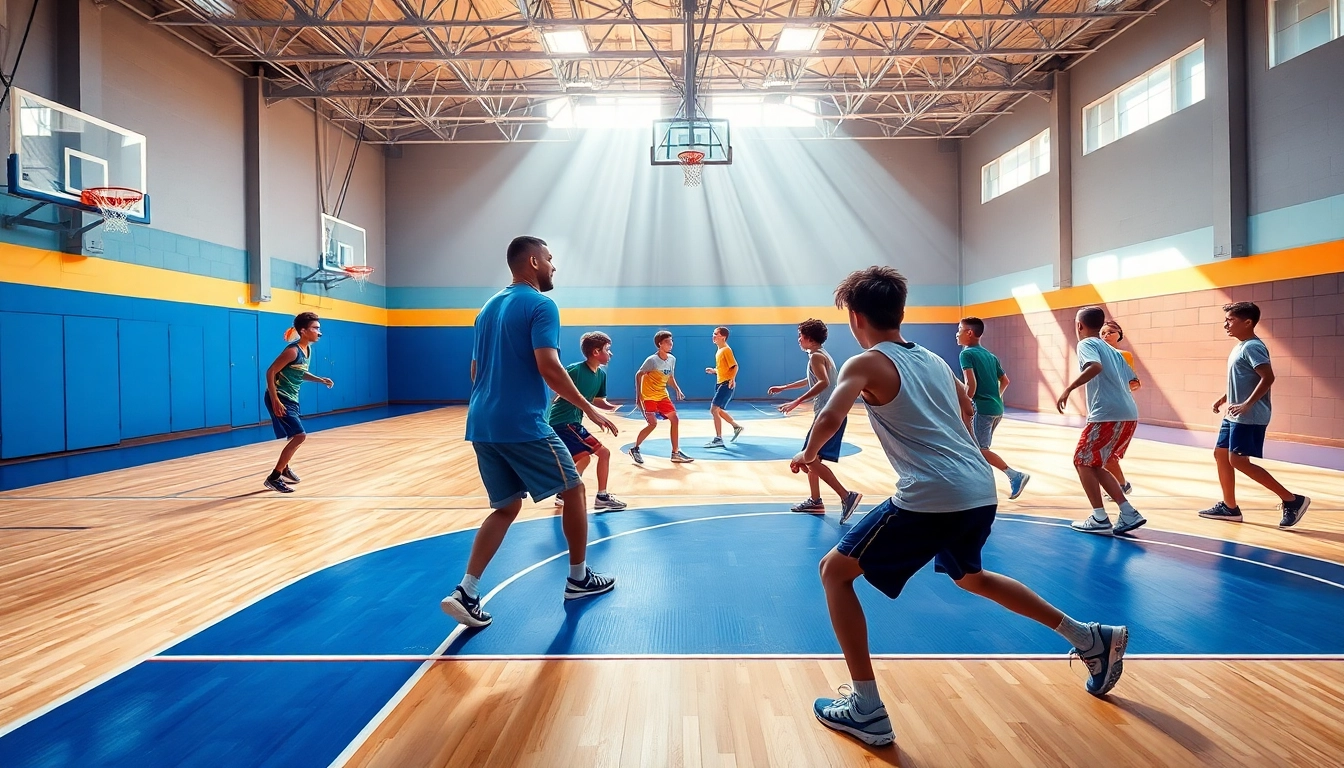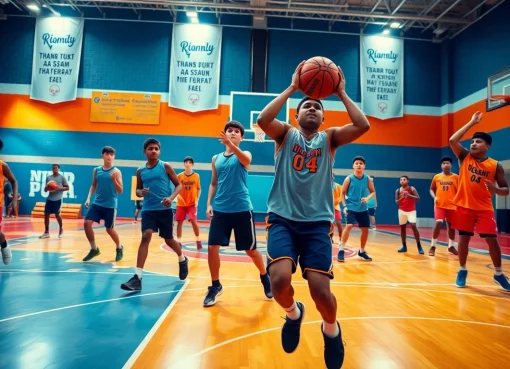Comprehensive Guide to Basketball Training Programs Near Me for All Skill Levels

Understanding Basketball Training Programs
What Are Basketball Training Programs?
Basketball training programs are structured activities designed to enhance the skills, techniques, physical fitness, and understanding of the game for players of all levels. They cater to youth and adults and vary based on participants’ skill levels and needs. Training programs may include individual sessions, group practices, camps, and clinics that focus on a wide range of aspects from basic skills to advanced tactics.
Types of Training Available
Basketball training programs can be categorized into several types, ensuring that every athlete finds a suitable path for development:
- Individual Training: Personalized sessions with a coach focusing on specific skills such as shooting, dribbling, or defense.
- Group Classes: Small groups of players who engage in drills and activities, fostering competition and teamwork.
- Camps and Clinics: Intensive programs often spanning several days, targeting various elements of the game, including both skill development and conditioning.
- Team Training: Sessions focusing on improving team dynamics, strategies, and play styles, often held during the season.
- Online Training: Digital platforms that provide virtual coaching and instructional videos to enhance learning and practice flexibility.
Benefits of Joining Local Programs
Participating in local basketball training programs offers numerous advantages:
- Skill Development: Access to tailored training methods that target individual weaknesses and build on strengths.
- Expert Coaching: Learning from experienced trainers and former players who can provide insights and strategies not easily found elsewhere.
- Networking: Opportunities to meet other basketball enthusiasts, forming friendships and potentially beneficial connections for future opportunities.
- Convenience: Local options mean easy access to physical venues, reducing travel time and associated costs.
- Community Involvement: Being part of a local program fosters a sense of belonging and supports community engagement.
Finding Basketball Training Programs Near Me
Online Resources and Directories
The internet serves as a crucial tool when searching for basketball training programs. Websites, forums, and social media platforms often have listings for local facilities. Many training centers maintain websites where they provide details about their services, schedules, and coaches. A practical first step for those looking to improve their skills in basketball would be to explore basketball training programs near me through directory services and local listings.
Evaluating Local Training Facilities
Once potential training options are identified, evaluating them becomes essential. Key factors to consider include:
- Facility Quality: Inspecting the gym or court where training occurs can significantly influence the quality of the experience. Look for well-maintained, safe environments with necessary equipment.
- Equipment Access: Availability of training aids such as hoops, shooting machines, strength training facilities, and video analysis tools can enhance the training experience.
- Location and Schedule: Ensure that the facility’s location is convenient and its training schedule fits your availability.
- Trial Classes: Many programs offer trial classes which can help players gauge their compatibility with the coaching style and fellow participants.
Coaches and Certification Considerations
The coach’s qualification is one of the most crucial aspects of a training program. Look for:
- Experience: Coaches with a background in competitive basketball often offer insights based on real-game experiences.
- Certifications: National coaching certifications can be an indicator of a coach’s commitment to their own education and professional standards.
- Player Testimonials: Reviews or testimonials from other athletes can provide candid feedback about the effectiveness of a coach’s approach.
- Coaching Style: Different coaching styles resonate with different players; consider what environment you thrive in (positive reinforcement, structured drills, etc.).
Key Components of Effective Training
Fundamentals vs. Advanced Techniques
Training must begin with a foundational focus on essential skills such as shooting, passing, dribbling, and defensive techniques. Mastery of these fundamentals is critical, as it prepares players for more advanced maneuvers and strategies. Gradually, as players advance, training should incorporate:
- Advanced Techniques: Incorporating complex combinations of moves, plays, and strategies unique to the player’s position on the court.
- Game Situations: Practicing specific scenarios that might occur during actual games, allowing players to build instinctive responses.
Physical Conditioning and Injury Prevention
A key aspect of basketball training is the focus on physical conditioning and injury prevention. Both are crucial for the longevity and success of any player:
- Aerobic and Anaerobic Training: Basketball requires a mix of stamina and power, necessitating training that builds both respiratory fitness and muscular strength.
- Flexibility Training: Stretching routines and yoga can greatly reduce the risk of injury while improving overall movement efficiency on the court.
- Proper Nutrition: Understanding the importance of diet and hydration will enhance recovery and performance.
Mental Aspects of Training in Basketball
The mental game is just as essential as the physical. Effective training should also focus on developing:
- Decision-Making Skills: Real-time thinking, reading defenses, and making split-second decisions can significantly impact a player’s effectiveness during competition.
- Focus and Concentration: Mental conditioning exercises, such as visualization techniques, can help players maintain composure under pressure.
- Resilience: Cultivating a strong mental attitude helps players to bounce back from mistakes and setbacks.
Success Stories and Testimonials
Real-Life Examples of Player Development
Many athletes across various levels testify to the life-changing effects of effective basketball training programs. For instance, numerous players have transitioned from local training academies to playing at collegiate or professional levels. These success stories serve as motivation and inspiration for current participants:
- Documented cases of players enhancing their skills extensively through structured training.
- Former high-school players sharing how local programs equipped them for college scholarship opportunities.
Community Impact of Local Programs
Basketball training programs extend their influence beyond individual player development, affecting the entire community:
- Youth Engagement: Programs often engage local youth, providing them with positive outlets for energy and teamwork.
- Community Identity: Support for local programs helps build a sense of pride and unity within the community through shared experiences and victories.
Building Lifelong Relationships Through Basketball
The bonds formed through the shared experience of training can lead to lifelong friendships and valuable connections within the sports community:
- Players often find that the relationships built during training extend well beyond the court, leading to personal growth and support networks.
- Networking opportunities for players aspiring to pursue careers related to basketball, coaching, or sports management are immense.
Maximizing Your Training Experience
Setting Personal Goals
To get the most out of any training program, setting clear, achievable goals is vital. Players should:
- Identify what they want to accomplish (e.g., improving shooting percentage, preparing for tryouts).
- Establish short-term and long-term goals that can help track progress effectively.
Maintaining Motivation and Discipline
Training can be arduous, and maintaining motivation is essential for success:
- Developing a routine can help players stay committed to their training schedule.
- Incorporating varied drills and practices can keep the training experience fresh and engaging.
Tracking Progress and Seeking Feedback
Players should maintain a training log or journal to document their practice sessions and progress. It is also encouraged to seek feedback from coaches regularly, as this can provide valuable insights into areas for improvement. Continuous evaluation and adjustment of one’s training approach are crucial for long-term success and fulfilling personal goals.


Leave a Comment